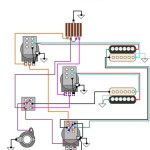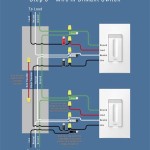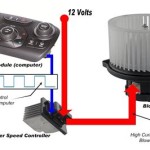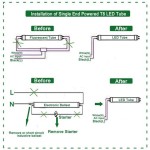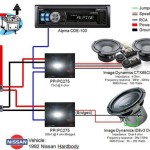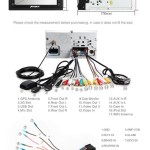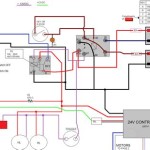A Speaker Wiring Calculator is a tool used to determine the appropriate wire gauge and length for connecting speakers to an amplifier. For instance, to connect speakers that are 50 feet from the amplifier, a 14-gauge wire would be suitable.
Speaker Wiring Calculators are essential for ensuring optimal sound quality and preventing damage to the equipment. They help determine the ideal wire size to minimize resistance and power loss, resulting in clear and undistorted sound. A notable historical development was the introduction of online calculators, which simplified the process and made it accessible to a wider audience.
In this article, we will delve into the intricacies of Speaker Wiring Calculators, exploring their technical details, considerations for different speaker types, and advanced features that enhance their precision and usability.
Understanding the essential aspects of Speaker Wiring Calculators is paramount for harnessing their full potential and ensuring optimal audio performance. These aspects encompass various dimensions, from technical specifications to practical considerations and advanced features.
- Wire Gauge: Determines the thickness and resistance of the wire.
- Length: Impacts the resistance and power loss in the wire.
- Speaker Impedance: Matches the impedance of the speakers to the amplifier.
- Amplifier Power: Considers the power output of the amplifier to avoid overloading.
- Speaker Sensitivity: Accounts for the efficiency of the speakers.
- Room Acoustics: Factors in the size and shape of the room.
- Wire Material: Explores the conductivity and durability of different materials.
- Connector Types: Ensures compatibility between wires and speakers.
- Safety Features: Protects against electrical hazards.
- Advanced Features: Includes calculators with impedance matching and loss calculations.
These aspects are interconnected and influence the overall performance of the speaker system. For instance, using an undersized wire for a long speaker run can result in significant power loss and distorted sound. Similarly, mismatched impedance can lead to reduced efficiency or even damage to the equipment. By considering these aspects, Speaker Wiring Calculators empower users to make informed decisions, ensuring clarity, accuracy, and longevity of their audio systems.
Wire Gauge
Wire gauge is a critical component of Speaker Wiring Calculators because it directly influences the resistance of the wire. Resistance, in turn, affects the power loss and sound quality of the speaker system. A thicker wire (lower gauge number) has less resistance, resulting in lower power loss and better sound quality. Conversely, a thinner wire (higher gauge number) has higher resistance, leading to greater power loss and potential sound distortion.
Speaker Wiring Calculators take wire gauge into account to ensure that the selected wire can handle the power requirements of the speaker system and minimize power loss. For example, a calculator may recommend a 14-gauge wire for a speaker that is 50 feet from the amplifier. This recommendation is based on the power handling capacity and resistance of a 14-gauge wire, ensuring that the speaker receives adequate power and produces optimal sound quality.
Understanding the relationship between wire gauge and resistance is essential for using Speaker Wiring Calculators effectively. By considering the wire gauge, length, and other relevant factors, these calculators provide accurate recommendations that optimize the performance and longevity of speaker systems. This understanding empowers users to make informed decisions about the wiring of their audio systems, ensuring the best possible listening experience.
Length
Within the realm of Speaker Wiring Calculators, the length of the speaker wire is a crucial factor that profoundly influences the resistance and power loss in the system. Understanding the implications of wire length is paramount for optimizing sound quality, minimizing power dissipation, and ensuring the longevity of the audio setup.
- Wire Resistance: As the length of the wire increases, its resistance also increases. This increased resistance impedes the flow of electrical current, leading to a decrease in the power delivered to the speakers.
- Power Loss: The resistance of the wire causes power loss in the form of heat dissipation. Longer wires have higher resistance, resulting in greater power loss and reduced efficiency of the speaker system.
- Voltage Drop: Over long distances, the voltage drop along the wire becomes more significant. This voltage drop can affect the performance of the speakers, potentially leading to reduced sound quality or even damage.
- Impedance Matching: Speaker Wiring Calculators consider wire length to ensure proper impedance matching between the amplifier and the speakers. Impedance matching is crucial for maximizing power transfer and minimizing distortion.
In summary, the length of the speaker wire has a significant impact on the resistance, power loss, voltage drop, and impedance matching in the system. Speaker Wiring Calculators take into account the wire length to provide accurate recommendations that optimize the performance and efficiency of the speaker system, ensuring the best possible listening experience.
Speaker Impedance
In the realm of Speaker Wiring Calculators, speaker impedance plays a pivotal role in ensuring optimal power transfer and sound quality. Impedance matching, which aligns the impedance of the speakers with the impedance of the amplifier, is a critical component of these calculators. When impedance is properly matched, the amplifier can deliver maximum power to the speakers without distortion or damage.
Speaker impedance is typically measured in ohms () and can vary depending on the speaker model and frequency. Amplifiers are also designed to operate within a specific impedance range. Mismatched impedance can lead to several issues, including reduced power output, increased distortion, and potential damage to the amplifier or speakers.
Speaker Wiring Calculators incorporate impedance matching into their algorithms to ensure that the recommended wire gauge and length are compatible with the impedance of the speakers and amplifier. By taking impedance into account, these calculators help users avoid impedance mismatch and its negative consequences.
In practice, understanding the relationship between speaker impedance and Speaker Wiring Calculators allows users to make informed decisions about their speaker system wiring. By matching the impedance of the speakers to the amplifier, they can optimize sound quality, minimize distortion, and extend the lifespan of their audio equipment.
Amplifier Power
In the realm of Speaker Wiring Calculators, amplifier power plays a crucial role in determining appropriate wire gauge and length to avoid overloading the amplifier or damaging the speakers. Amplifier power, measured in watts, represents the maximum electrical power that the amplifier can deliver to the speakers.
Understanding the relationship between amplifier power and Speaker Wiring Calculators is critical because using an undersized wire for a high-powered amplifier can lead to excessive current draw, causing the amplifier to overheat and potentially shut down or fail. Conversely, using an oversized wire for a low-powered amplifier is not necessary and can result in wasted materials and increased cost.
Real-life examples of amplifier power considerations within Speaker Wiring Calculators include:
- A calculator may recommend a 12-gauge wire for an amplifier with a power output of 100 watts and speakers that are 25 feet away.
- For a more powerful amplifier with an output of 200 watts and speakers that are 50 feet away, the calculator may suggest a 10-gauge wire.
By considering amplifier power, Speaker Wiring Calculators assist users in selecting the appropriate wire size to ensure safe and efficient operation of their audio systems. This understanding empowers users to optimize sound quality, prevent equipment damage, and extend the lifespan of their speaker systems.
Speaker Sensitivity
Speaker sensitivity, an intrinsic characteristic of speakers, is a crucial factor considered by Speaker Wiring Calculators. It measures the speaker’s ability to convert electrical power into acoustic output, directly influencing the system’s efficiency and overall performance.
- Power Handling: Sensitive speakers can produce higher sound pressure levels with less power, reducing the strain on the amplifier and extending its lifespan.
- Efficiency Rating: Measured in decibels (dB), speaker sensitivity indicates the sound pressure level produced by the speaker at a specified distance and power input.
- Impedance Compatibility: Highly sensitive speakers may require a higher gauge wire to maintain optimal impedance matching, ensuring efficient power transfer from the amplifier.
- Room Size and Acoustics: Speaker sensitivity should be considered in conjunction with room size and acoustics. More sensitive speakers may be suitable for smaller rooms, while less sensitive speakers may be necessary for larger spaces.
Understanding speaker sensitivity is paramount for accurate wire gauge and length calculations. By incorporating this factor, Speaker Wiring Calculators provide precise recommendations that optimize system efficiency, minimize distortion, and enhance the overall listening experience.
Room Acoustics
In the realm of Speaker Wiring Calculators, room acoustics play a significant role in determining the optimal wire gauge and length. The size and shape of the room impact sound propagation, absorption, and reflection, influencing the overall listening experience and system performance.
- Room Dimensions: The length, width, and height of the room affect sound wave propagation and the distribution of sound pressure levels.
- Room Shape: Regular-shaped rooms tend to exhibit more evenly distributed sound, while irregularly shaped rooms can create acoustic anomalies such as standing waves or flutter echoes.
- Surface Materials: The materials used in the room’s construction and furnishings, such as drywall, carpet, or wood, influence sound absorption and reflection, shaping the room’s acoustic signature.
- Furniture Placement: The placement of furniture and other objects in the room can affect sound diffusion and absorption, impacting the overall sound quality.
Understanding room acoustics allows Speaker Wiring Calculators to make more accurate recommendations. By considering factors such as room size, shape, and materials, these calculators can optimize wire selection and length to compensate for potential acoustic issues and enhance the sound quality and listening experience in a given space.
Wire Material
In the realm of Speaker Wiring Calculators, the choice of wire material is a critical component that significantly impacts the overall performance and longevity of the audio system. The conductivity and durability of the wire material directly influence the sound quality, power handling capabilities, and lifespan of the speaker setup.
Different wire materials exhibit varying degrees of conductivity, which affects the efficiency of electrical current flow. Highly conductive materials, such as copper and silver, minimize resistance and power loss, resulting in better sound quality and higher amplifier efficiency. By incorporating the conductivity properties of different materials into their algorithms, Speaker Wiring Calculators can accurately determine the appropriate wire gauge and length to maintain optimal signal transmission and minimize power dissipation.
Durability is another crucial aspect of wire material selection. Speaker wires are often subjected to physical stress, such as bending or pulling, making durability a key factor in ensuring long-term performance. Durable materials, such as copper-clad aluminum (CCA) and oxygen-free copper (OFC), resist corrosion, oxidation, and mechanical damage, extending the lifespan of the speaker system. Speaker Wiring Calculators consider the durability of different wire materials to ensure that the recommended wire can withstand the rigors of real-world use.
In practical applications, understanding the connection between wire material and Speaker Wiring Calculators empowers users to make informed decisions about their speaker systems. By selecting the appropriate wire material based on factors such as conductivity, durability, and cost, users can optimize sound quality, maximize amplifier efficiency, and ensure the longevity of their audio equipment.
Connector Types
Within the realm of Speaker Wiring Calculators, connector types play a pivotal role in ensuring seamless connectivity and optimal performance of speaker systems. Compatibility between wires and speakers is paramount for transmitting audio signals with minimal loss and distortion, and the choice of connectors directly influences this compatibility.
- Plug and Socket Types: Speaker wires utilize various plug and socket designs, such as banana plugs, spade connectors, and pin connectors, to facilitate secure and efficient connections. Speaker Wiring Calculators consider the compatibility of these connectors with the speaker terminals and amplifier outputs, ensuring a proper fit and reliable contact.
- Wire Termination Methods: The method used to terminate the ends of speaker wires, such as soldering, crimping, or twisting, can impact the quality of the connection. Speaker Wiring Calculators provide guidance on appropriate termination techniques based on the type of connectors and wire gauge used, ensuring optimal signal transfer.
- Polarity Maintenance: Maintaining proper polarity is crucial for accurate sound reproduction. Speaker Wiring Calculators assist users in identifying the positive and negative terminals of speaker wires and connectors, ensuring that they are connected correctly to the amplifier and speakers, preserving the intended stereo imaging and tonal balance.
- Durability and Safety: Connector types also affect the durability and safety of the speaker system. Robust connectors with secure locking mechanisms minimize the risk of accidental disconnections, ensuring uninterrupted audio playback. Additionally, certain connectors incorporate safety features, such as insulation and strain relief, to prevent electrical hazards and protect the equipment.
Understanding the role of connector types in Speaker Wiring Calculators empowers users to make informed decisions about the compatibility and performance of their speaker systems. By considering the various facets discussed above, these calculators provide comprehensive recommendations for selecting the appropriate connectors that ensure optimal sound quality, reliability, and safety.
Safety Features
Within the realm of Speaker Wiring Calculators, safety features play a critical role in ensuring the protection of users and equipment from electrical hazards. These features are an integral part of these calculators, providing essential safeguards against potential electrical issues that could arise in speaker systems.
One of the primary safety features in Speaker Wiring Calculators is the incorporation of insulation ratings. Insulation acts as a protective barrier around the electrical conductors, preventing current leakage and minimizing the risk of electrical shock. Speaker Wiring Calculators consider the insulation rating of the wires and ensure that the recommended wire gauge and length meet or exceed the required safety standards. This helps prevent insulation breakdown, which could lead to short circuits, fires, or other hazardous situations.
Another crucial safety feature is the inclusion of strain relief mechanisms in the calculator’s recommendations. Strain relief prevents excessive bending or pulling of the wire at the connection points, reducing the risk of wire damage and potential electrical faults. Speaker Wiring Calculators take into account the mechanical stress that wires may encounter during installation and use, and recommend appropriate strain relief measures to ensure the longevity and safety of the speaker system.
Understanding the connection between safety features and Speaker Wiring Calculators is paramount for ensuring the safe and reliable operation of audio systems. By incorporating these safety considerations into their calculations, Speaker Wiring Calculators empower users to make informed decisions about the selection and installation of speaker wires, minimizing electrical hazards and protecting both equipment and individuals.
Advanced Features
As Speaker Wiring Calculators have evolved, advanced features have emerged to enhance their capabilities and provide users with more comprehensive and precise recommendations. Among these advanced features is the inclusion of calculators with impedance matching and loss calculations, which offer several notable benefits for optimizing speaker systems.
-
Impedance Matching Calculator:
This feature enables users to input the impedance of their speakers and amplifier, and the calculator computes the ideal wire gauge and length to achieve optimal impedance matching. This ensures that the amplifier can deliver maximum power to the speakers without distortion or damage.
-
Power Loss Calculator:
This feature takes into account the length and gauge of the speaker wire, as well as the power output of the amplifier, to calculate the amount of power that will be lost due to resistance in the wire. This information helps users determine if the selected wire is adequate for the power requirements of the system.
-
Wire Resistance Calculator:
This feature calculates the resistance of the speaker wire based on its length, gauge, and material. Understanding the resistance of the wire is crucial for ensuring that the amplifier can provide sufficient power to the speakers.
-
Capacitance and Inductance Calculator:
These features calculate the capacitance and inductance of the speaker wire, which are important factors in determining the overall impedance of the system. By considering these parameters, the calculator can provide more accurate recommendations for wire gauge and length.
In conclusion, the advanced features offered by Speaker Wiring Calculators, including impedance matching and loss calculations, empower users to design and install speaker systems that deliver optimal sound quality, efficiency, and safety. These features provide valuable insights into the electrical characteristics of the system, enabling users to make informed decisions about wire selection and system configuration.









Related Posts

